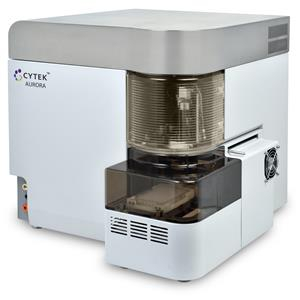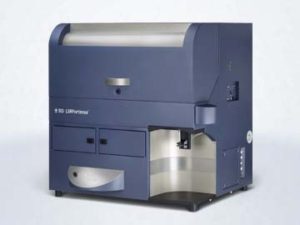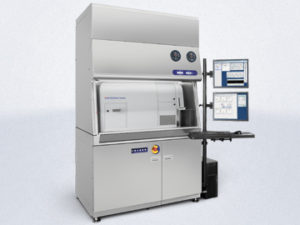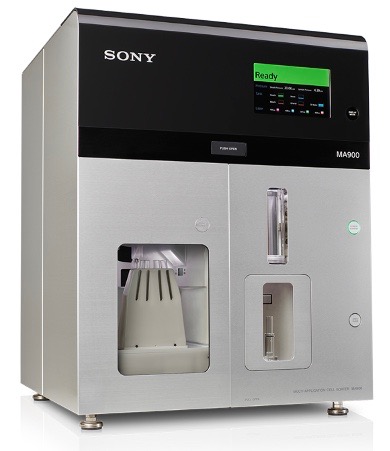Flow Cytometry
Flow Cytometry is a technology that analyzes multiple physical and/or chemical characteristics of single particles, usually cells, as they flow in a fluid stream through a beam of light. The properties measured include a particle’s relative size, relative granularity or internal complexity, and relative fluorescence intensity.
Cell Analyzers
-
Cytek Aurora Spectral Flow Cytometer
Show More
-

The Aurora is equipped with five lasers (355nm, 405nm, 488nm, 561nm, and 640nm) and allows for 64 channels of detection. The optional plate loader can be used to automate the acquisition of samples in a 96-well plate format.
Sample acquisition and analysis is done using SpectroFlo.
Sample analysis can also be done using Flowjo or FCS Express (both available to use in NMS 2.114).
The Aurora only accepts 5mL polystyrene tubes, or 96-multi-well plates if using the plate loader.
Instrument Configuration: Aurora Config
Aurora Spectrum Analyzer (Biolegend)
Instrument Access: Assisted use and training are available. To schedule assisted use or training please contact Richard Salinas.
Fees: trained user: $45/hour; assisted use: $115/hour
-
Cytek Northern Lights Spectral Flow Cytometer
Show More
-
Instrument Access: Assisted use and training are available. To schedule assisted use or training please contact Richard Salinas.
Fees: trained user: $45/hour; assisted use: $115/hour
-
BD LSRFortessa SORP Flow Cytometer
Show More
-

The Fortessa is equipped with four lasers (405nm, 488nm, 561nm and 635nm) and 15 parameters for detection, which includes 2 light scatter parameters (forward and side scatter) and 13 fluorescence parameters. This instrument can be connected to the optional High Throughput Sampler (HTS) unit to accommodate automated specimen handling for 96- and 384-well plates. In addition, this system is also equipped with the FACSFlow Supply System to allow larger volume tanks for sheath and waste, as well as improved fluidic stability.
Sample acquisition and analysis is done using FACSDiva v6.1.3.
Sample analysis can also be done using Flowjo or FCS Express (both available to use in NMS2.114).
The Fortessa only accepts 5mL polystyrene tubes, or 96- and 384-multi-well plates if using the HTS unit.
Instrument Configuration: Fortessa Config
Fluorescence Spectrum Analyzer (BD Biosciences)
Instrument Access: Assisted use and training are available. To schedule assisted use or training please contact Richard Salinas.
Fees: trained user: $45/hour; assisted use: $115/hour
Cell Sorters
-
BD FACSAria Fusion SORP Cell Sorter
Show More
-

The BD Fusion is a state-of-the-art cell sorter equipped with five dedicated lasers (355nm, 405nm, 488nm, 561nm, and 637nm) for excitation and 20 parameters for detection, which includes 2 light scatter parameters (forward and side scatter) and 18 fluorescence parameters. The Fusion sits inside a custom designed biosafety cabinet to address the concerns of biological safety issues and to protect operators from potential accidental exposure from biological samples. The Fusion has been verified to meet personnel and product protection standards for a Class II, Type A2 biosafety cabinet as specified by the National Sanitation Foundation International Standard 49.
Three sizes of nozzles (70, 85 and 100-micron) are offered to accomodate a wide range of particle sizes. The Fusion offers two- and four-way bulk sorting devices for 1.5mL microfuge tubes, 12 x 75mm 5mL tubes or 15mL conical tubes. The Automated Cell Deposition Unit (ACDU) option is available for sorting directly into multi-well plates or onto microscope slides.
Instrument Configuration: Fusion Config
Fluorescence Spectrum Analyzer (BD Biosciences)
Instrument Access: Assisted use and training are available. To schedule assisted use or training please contact Richard Salinas.
Fees: trained user: $62/hour; assisted use: $132/hour
-
Sony MA900 Cell Sorter
Show More
-

The Sony MA900 is a highly automated, cell sorter equipped with four lasers (405nm, 488nm, 561nm, and 637nm) for excitation and 14 parameters for detection, which includes 2 light scatter parameters (forward and side scatter) and 12 fluorescence parameters. The MA900 uses a replaceable, microfluidics, cell “sorting chip” which provides increased reliability and greatly simplifies the cell sorting setup. Automated calibrations include Sort Chip Alignment, Laser Delay Adjustment, Droplet Stream Calibration, Side Stream Calibration and Sort Delay Calibration.Three sizes of “sort chips” (70, 100, and 130-micron) are available to accommodate a wide range of particle sizes. The MA900 offers two- and four-way bulk sorting devices for 1.5mL microfuge tubes, 5mL tubes or 15mL conical tubes. Sorting directly into multi-well plates is also supported.
Instrument Configuration: MA900 Config
Instrument Access: assisted use and training are available. To schedule assisted use or training please contact Richard Salinas.
Fees: trained user: $62/hour; assisted use: $132/hour
User Info
-
Tutorials
Show More
-
- Introduction to Flow Cytometry - Video Tutorial from BD Biosciences
- A Basic Introduction - Electronic version of Michael G. Ormerod's book
- Practical Flow Cytometry - Electronic version of Howard Shapiro's book
- FlowJo Tutorials
- Training Resources - Chromocyte
- Introduction to Fluorescence - LifeTechnologies
- Flow Cytometry Webinars - BD Biosciences
-
Antibody Panel Helpers
Show More
-
- FluoroFinder - Web-based Antibody Panel Tool
-
Fluorescence Spectral Viewers
Show More
-
Vendors
Show More
-
User Resource Groups
Show More
-
- ISAC - International Society for Advancedment of Cytometry
- Purdue Cytometry - Archived Discussion List
Data Analysis
- CytoBank – is a web-based platform that allows you to analyze, manage, and share data (free).
- FCS Express – (NMS 2.114) a nice alternative to FlowJo for analyzing data files. FCS Express can also be used for analysis of microscopic image files. User-friendly, easy to generate slides. Tutorials and webinars available to view.
- FlowJo – (NMS 2.114) provides a nice set of videos and tutorials with demo data. We have a licensed copy of FlowJo available to all users. Alternatively, UT researchers can purchase a FlowJo site license for their laboratory use. For more information on site license availability, please contact Richard Salinas.
- IDEAS – for analyzing your Amnis ImageStream data files. You’ll need to create a user account to download the software (free).
- PESTLE – for high content analysis (free).
- SPADE – SPADE stands for “Spanning-tree Progression Analysis of Density-normalized Events”. It is used to visualize and analyze high-dimensional flow cytometry data, especially data collected with the CyToF mass cytometer. SPADE clusters phenotypically-similar cells into a hierarchy that allows high-throughput, multidimensional analysis of heterogeneous samples.
- SPICE – stands for “Simplified Presentation of Incredibly Complex Evaluations”. Multicolor flow cytometry experiments generate vast amounts of complex data and require sophisticated software for their evaluation. SPICE is a data-mining software application that analyzes large FlowJo data sets from polychromatic flow cytometry and organizes the normalized data graphically. SPICE enables users to discover potential correlations in their experimental data within complex data sets. Many potential applications for SPICE exist: the software can be used to analyze any multivariate data set for which a series of nominal measurements and a single continuous measurement is available (free).